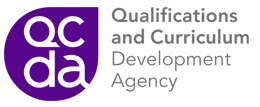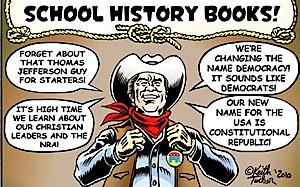The idea of a ‘core curriculum’ is a way of avoiding “the ideology diversity of the protest era” and imposing an official, “cleansed” view of history and a standard view of English. The aim is to support the status quo and transmit “an official value system disguised as universal knowledge” instead of empowering students or educating future citizens or encouraging diverse and pluralistic curricula.
Increasingly business groups are influencing what is core knowledge.
In 1974 the National Council of Teachers of English (NCTE) in the US agreed to a policy called ‘Student’s Rights to their own Language’ which recognised that the language of Standard English was the language of teachers, literature and the elite but that most people spoke a different form of English. Teachers wanted to widen the English curriculum to accept “white colloquial, black bi-dialectical, Hispanic bilingual” language.
Conservatives and business people sought to reinforce Standard English (which is used in business) and ensure that colloquial English and the ‘language of the left’ were declared illegitimate. Ira Shor notes that language is a tool of power and the “dialect that dominates indicates the group that dominates”. Elite language was, however, imposed in the US under the guise of ‘standards’ and ‘quality’.
 The role of the UK Qualifications and Curriculum Authhority (QCA) is to "develop the curriculum, improve and deliver assessments, and review and reform qualifications".
The role of the UK Qualifications and Curriculum Authhority (QCA) is to "develop the curriculum, improve and deliver assessments, and review and reform qualifications".
In 2006:
In Australia, the Australian Council for Educational Standards (ACES), founded by Ray Evans, a former business executive with Western Mining Corporation and co-founder of various business-financed right-wing activist groups, campaigned for schooling to reinforce mainstream Australian moral, political and economic values rather than question them.
Anthony Welch, in his book on Class, Culture and the State in Australian Education, claimed that the concern with literacy ‘standards’ signified “a desire to return to an ideal society, embodying traditional discipline, traditional moral codes, and more monolithic cultural, racial, religious and gender regimes.” Hence the emphasis on literature from the elitist English traditions.
The Australian Curriculum, Assessment and Reporting Authority (ACARA) is:
Both men have affiliations with the University of Melbourne and were patrons of the Education Foundation Australia, which was supported by various foundations, including the Goldman Sachs JBWere Foundation, the Macquarie Bank Foundation, the Myer Foundation and the Pratt Foundation, as well as coporations including, Allens Arthur Robinson, AMCOR Australasia, and Credit Suisse, Asia Pacific.
Former prime pinister John Howard noted: “Until recent times, it had become almost de rigueur in intellectual circles to regard Australian history as little more than a litany of sexism, racism and class warfare.”
The NSW Education Minister, Carmel Tebbutt, defended the NSW curriculum arguing that the attempt to “limit history to one ‘approved’ version or English to the ‘great works’ are doing students a disservice”. She noted that it was important for students to understand the historical context of literature and events and that they are subject to interpretation from a variety of viewpoints, as well as to recognise that some viewpoints and voices have been excluded.
Nevertheless the four person committee appointed to draft a national history curriculum includes Gerard Henderson, head of the right wing think tank, The Sydney Institute – a man with little teaching experience, and Geoffrey Blainey, a controversial historian associated with a number of right wing causes and critical of what he calls the “black armband view of history”. This is a term used to describe a critical view of history which supposedly induces shame for the way Aborigines, immigrants and women were treated in the past.
 In 2014, Education Minister Chris Pyne appointed think tank commentator and former Liberal Chief of Staff, Kevin Donnelly, and Ken Wiltshire, professor of public administration in University of Queensland’s business school, to review the national school curriculum with the aim of removing “partisan bias”.
In 2014, Education Minister Chris Pyne appointed think tank commentator and former Liberal Chief of Staff, Kevin Donnelly, and Ken Wiltshire, professor of public administration in University of Queensland’s business school, to review the national school curriculum with the aim of removing “partisan bias”.
Donnelly is an associate of the right wing think tank, the Institute of Public Affairs, and is on record criticising the whole idea of a national school curriculum. Ironically, he pointed out that “if the curriculum is centrally mandated, especially by the state, then it is very easy for it to be co-opted by whoever is in control at the time to further their own ends”. Apparently this is not a concern if he and Christopher Pynes are the ones in control and doing the co-opting.
Donnelly claimed in 2000 that the Queensland curriculum (presumably before it was reviewed by Wiltshire in the mid-1990s) focussed “on such issues as the environment, multiculturalism and social justice; all with a futures perspective to ensure that students were ready to embrace the brave new world of the politically correct”. He claims the current history curriculum “undervalues western civilisation and the significance of Judeo-Christian values to our institutions and way of life.”
Donnelly and Wiltshire chose specialist subject reviewers, without any consultation with the Department of Education. Several of these reviewers had close associations with the Liberal Party and/or conservative think tanks, including the Institute of Public Affairs and the Centre for Independent Studies.
As a result of the review, the government announced that the primary school curriculum would combine history, geography, civics and citizenship and economics and business into one social sciences subject, reducing the amount of humanities and social sciences by 30 percent.
 Business leaders and politicians in the US have also promoted history standards that portray the US as a land of willing immigrants with a “White Anglo-Saxon” culture where hard work produced prosperity and progress; “a history that emphasized U.S. accomplishments and provided students with uplifting ideals” rather than one that covered negative aspects of history such as the Ku Klux Klan and McCarthyism. Their preferred version of history ignored the experience of many ethnic groups in the US including African Americans, Native Americans and Mexican Americans. Writing in Rethinking Schools, Barbara Miner, says:
Business leaders and politicians in the US have also promoted history standards that portray the US as a land of willing immigrants with a “White Anglo-Saxon” culture where hard work produced prosperity and progress; “a history that emphasized U.S. accomplishments and provided students with uplifting ideals” rather than one that covered negative aspects of history such as the Ku Klux Klan and McCarthyism. Their preferred version of history ignored the experience of many ethnic groups in the US including African Americans, Native Americans and Mexican Americans. Writing in Rethinking Schools, Barbara Miner, says:
One of the most interesting yet untold stories of the history of standards is how the governors and corporate leaders, aided by conservative think tanks, took over the standards movement and transformed it into a top-down process that establishes an official version of knowledge and sets back efforts to forge a multicultural vision, in the process valuing discrete facts, memorization, and ‘basics’ over critical thinking and in-depth understanding.
For corporations, the important thing is to teach a set of political and social values that support business values and do not question the contribution of business to social well-being. “More than anything, these vested interests fear a schooling which encourages critical thinking.” They have therefore sought to reduce education to modules of knowledge that it is desirable for employees to have.
The Business Roundtable published this excerpt of a fifth grade content standard for citizenship education that it approved of. It requires students to be able to:
In this way citizenship education is reduced to a core of ‘facts’ that students should know rather than an analytical and critical approach to democracy.
If you have any examples or updates you would like to contribute please email them to me and I will add them here. Please give references for where you sourced the information.